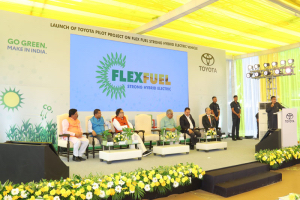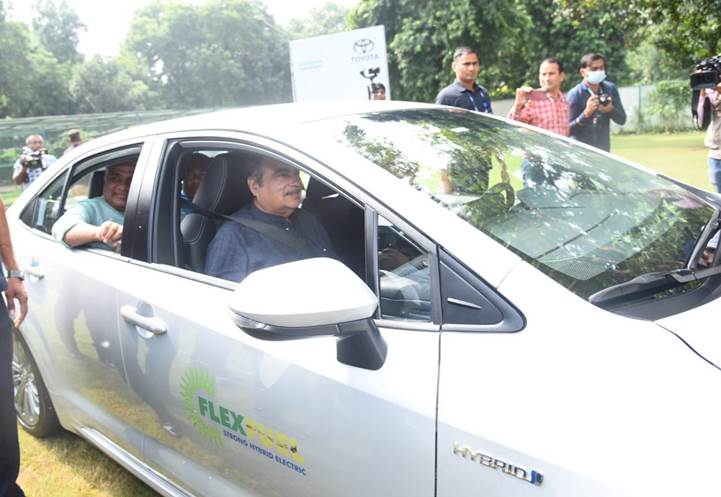
New Delhi: Toyota launched a first-of-its-kind pilot project on Flexi-Fuel Strong Hybrid Electric Vehicles (FFV-SHEV) in India today which would run on 100% petrol as well as 20 to 100% blended ethanol and electric power.
During the launch, the Toyota Corolla Altis FFV-SHEV, imported from Toyota Brazil for the pilot project was unveiled. This initiative marks Toyota’s first step to promote and create awareness on Ethanol as an important indigenous, carbon-neutral energy pathway, along with the advanced Strong Hybrid Electric Vehicle technology of Toyota that can help India achieve true self-reliance, and contribute towards the national target of Carbon Net-Zero by 2070.
Further, as a part of this project, collected data will be shared with the prestigious Indian Institute of Science, for conducting a deeper study about the well-to-wheel carbon emissions of FFV / FFV-SHEV in the Indian context. In this regard, a Memorandum of Understanding was also signed between Toyota Kirloskar Motor (TKM) and the Indian Institute of Science, Bangalore.

Launching the project, Union Minister for Road Transport and Highways Nitin Gadkari said the success of this pilot project will create an ecosystem of electric vehicles and make “New India, a global leader in the manufacture of these electric vehicles”. He said such technologies are innovative, revolutionary, sustainable, cost-effective, and energy-efficient and will completely transform the transportation sector in New India.
The Government has recently launched second-generation technologies for producing ethanol from agricultural residues like parali, which is currently otherwise burnt. Toyota said this possibility will not only prevent severe air pollution but also help generate wealth from waste.
A Toyota press release stated that as one of the most appropriate solutions, ethanol holds tremendous potential for India as it is an Indigenous and clean energy source, that can significantly reduce fossil fuel consumption, the energy import bill and carbon emissions. Being agriculture-based, higher use of ethanol as fuel will also increase farmer incomes and create new jobs, thereby boosting the rural economy besides increasing revenue for the Government from surplus sugar and food grains.
India has already achieved 10% ethanol blending five months ahead of schedule. The implementation of 20% ethanol blending in petrol by 2025-26 is expected to substitute 86 million barrels of Gasoline, thereby leading to forex savings of Rs. 30,000 crores for India, as well as reducing 10 Million tons of carbon emissions. Given the huge potential of ethanol production that exists up to and beyond E20, these benefits can increase multi-fold with the introduction of Flexi Fuel Vehicle (FFV) technology, which can flexibly use higher ethanol blends from 20% to 85%.
Globally, many countries like Brazil have benefited from the large-scale introduction of FFVs. In fact, in Brazil, an innovative Flexi fuel-strong Hybrid electric vehicle technology (FFV – SHEV) has been introduced by Toyota Brazil, which has the lowest Well-to-Wheel (W2W) carbon emissions for any technology in the country. An FFV– SHEV has a Flexi Fuel engine and an electric powertrain, thus providing the dual benefit of higher ethanol use and greater fuel efficiency, as it can run for significant time periods in its EV mode, wherein the engine is shut off. The FFV-SHEV has much higher economic multiplier benefits, as it can hasten local manufacturing of electric and Flexi-fuel powertrain parts, thus providing a disruption-free and low-risk industry and energy transition. As this technology provides the opportunity to benefit from both electrification and bio-fuel energy pathways, it enables a faster reduction of fossil fuel consumption, and CO2 emissions, as well as boosts the agrarian economy.
– global bihari bureau





